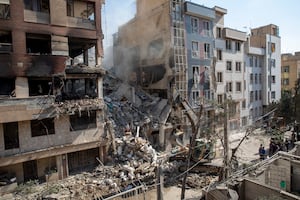The Israeli army said on Saturday it had called up reservists to bolster its forces along the borders with Lebanon and Syria, amid fears of a regional escalation as tensions with Iran reach unprecedented levels.
The military said the move was to prepare for “various scenarios”. It comes after Israel carried out its largest military strike against Iran on Friday, prompting retaliatory air strikes.
Israeli officials say the deadly attack on Iranian nuclear and military facilities was necessary to prevent its long-standing enemy from building a nuclear bomb, which it sees as an existential threat.
The exchange of air strikes has raised fears of a regional spillover, even as Iran’s regional allies, including Hezbollah, the powerful Lebanese political party and Tehran’s most significant proxy, have given no indication that they would join any retaliatory attacks.
Hezbollah has been significantly weakened by 14 months of conflict with Israel, including two months of intense Israeli aerial bombardment that crippled much of its command structure and arsenal.
The fall of Bashar Al Assad’s regime in Syria, a key member of the so-called Axis of Resistance, an Iran-led alliance opposing US and Israeli influence, has further undermined Hezbollah, severing its only land weapons supply route.
Lebanese officials have urged Hezbollah not to join Iran's response to Israeli attacks, and the group has assured them it will not take part, security sources told The National on Saturday.
The Israeli army said it has called up the headquarters of the 146th Reserve Division, along with the Iron Fist and Etzioni reserve brigades, to reinforce positions along the northern border with Lebanon.
Several other reserve battalions have also been mobilised and deployed to the Syrian border, the army said.
Analysts, military experts and western diplomats have told The National that Hezbollah is in no position to support Iran in any confrontation with Israel.
Still, fears linger as Lebanon's relative stability hangs by a thread. On Saturday, Lebanese President Joseph Aoun chaired a meeting about the Iran-Israel developments with leading officials.



